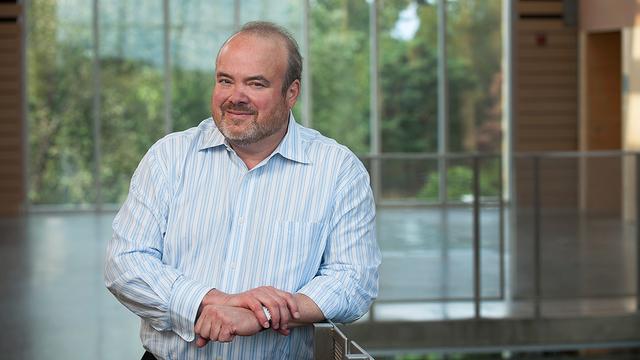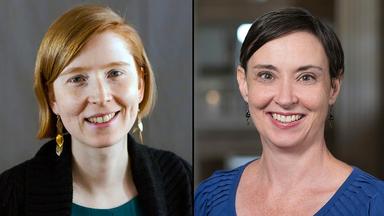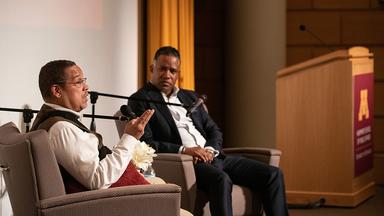The Humphrey School of Public Affairs’ most highly regarded scholar in the field of political analysis and public policy has been elected to the American Academy of Arts and Sciences, one of the nation’s oldest and most prestigious honor societies.
Professor Larry Jacobs, the McKnight Presidential Chair in Public Affairs, the Walter F. and Joan Mondale Chair for Political Studies, and director of the Center for the Study of Politics and Governance (CSPG), is one of five University of Minnesota researchers chosen for membership in the Academy this year.
The American Academy of Arts and Sciences honors those making preeminent contributions to their fields and the world. Members are leading scholars in the fields of science and technology, arts and humanities, international affairs, and public affairs. Jacobs is the first Humphrey School faculty member to receive this recognition.
“Being elected to the Academy is tremendously gratifying. It’s a pinnacle of scholarly recognition for my career of research,” Jacobs says. “For me, research and public engagement are intertwined; my research equips me to work in the public policy space, and my public work informs the questions I address and research I pursue as a scholar.”
Jacobs says even at a young age, he became aware of disparities and injustice in society, and his father inspired him to “scrutinize our politics and think for myself.”
He also counts former Vice President Walter Mondale as a source of inspiration and “my most influential professional mentor.” The two of them have co-taught a class on the U.S. Constitution and national security for the last 15 years.
“Some political science colleagues are uncomfortable with my blending of research with the problems of the public. My advantage is that I have been guided by the dignified and principled model of Walter Mondale,” says Jacobs.
The Academy was founded in 1780 by John Adams, John Hancock, and others who believed the new republic should honor exceptionally accomplished individuals and engage them in advancing the public good. And it continues to be a leading center for independent policy research.
“When Academy members come together, bringing their expertise and perspectives to our work, they help develop new insights and potential solutions for some of the most complex challenges we face,” says Nancy Andrews, chair of the Academy’s board of directors.
The Academy’s projects and publications are focused on the arts and humanities, democracy and justice, education, global affairs, and science.
“This is a tremendous honor for Professor Jacobs and for the Humphrey School,” says Dean Laura Bloomberg. “Under his direction, the Center for the Study of Politics and Governance has become the preeminent hub for political and policy analysis in the Midwest and across the country. Larry’s dedication to strengthening democratic institutions and deepening civic engagement stands as a shining example of how scholars can play a vital role in solving society’s most challenging problems.”
Each candidate for membership to the Academy must have two nominators who are already members, and they must be from different institutions. Current Academy members review and elect the candidates each year. This year 276 new members were chosen out of some 1,300 nominees. The primary criteria for election are excellence in the field and a record of continued accomplishment.
“I am enormously grateful to the Humphrey School and the University of Minnesota for supporting my blending of research and public engagement,” Jacobs says. “At a time when too much of the academy is retreating into hermetic theory and research methods, the Humphrey School has driven me to link the two and to share my research publicly.”
Jacobs has taught at the University of Minnesota since 1988. He has authored or edited 16 books and more than 100 articles on elections, legislative and presidential politics, elections and public opinion, and a range of public policies.


